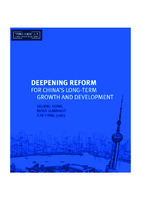Deepening Reform for China’s Long-term Growth and Development
Contributor(s)
Song, Ligang (editor)
Garnaut, Ross (editor)
Fang, Cai (editor)
Language
EnglishAbstract
The Chinese economy has entered a new phase of development in which sources of growth are not so much dependent upon pure increases in labour, investment and credit expansion, but from productivity improvement, structural changes, technological progress and the benefits from improvement of the social security and welfare improvement. When market functions are fully established to become a main channel for allocating resources, the entrepreneurship will flourish engaging in more innovative activities, workers will move more freely and have more incentives to improve their skills, firms will become more productive through market entry and exit, the economic structure will become more balanced because of the improved resource allocation, and in the end, growth will become more spontaneous and sustainable. In this sense, reforms could deliver ‘dividend’ by raising China’s potential economic growth rates. For China to confront all the challenges it faces at present, the reforms undertaken now have to be deep, comprehensive and far-reaching in order to succeed in paving the way for China to complete the task of transformation in the long-term. There is no better alternative than deepening the market-oriented reform in advancing the course of China’s modernisation for future development and prosperity and lifting China to the status of a developed economy in the next two decades. The recent China update books have covered the topic of reform from different angles and this new book is another attempt to address this important issue.
Keywords
economy; transformation; expansion; china; Foreign direct investment; Gross domestic product; State-owned enterpriseDOI
10.26530/OAPEN_496494ISBN
9781925021769OCN
945782315Publisher
ANU PressPublisher website
https://press.anu.edu.au/Publication date and place
2014Classification
International economics


 Download
Download Web Shop
Web Shop